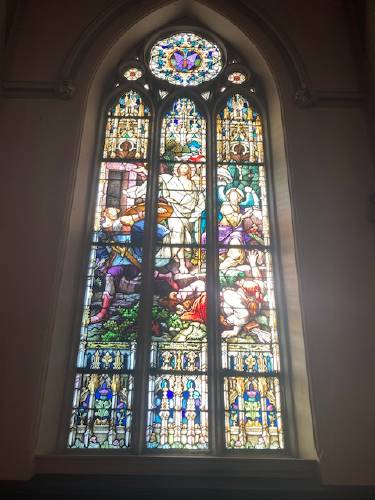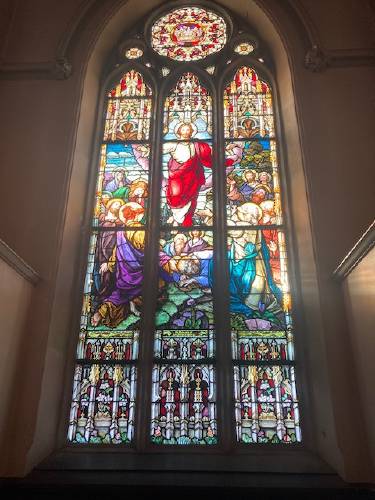Judge wants diocese, Northampton to resolve St. Mary stained-glass removal before a possible Thursday ruling
|
Published: 02-27-2024 3:42 PM
Modified: 02-28-2024 1:54 PM |
SPRINGFIELD — A federal judge scolded both the Diocese of Springfield and the city of Northampton for needing to resort to a lawsuit to settle a dispute over the removal of five stained-glass windows at the St. Mary of the Assumption Church on Elm Street, saying that such matters between municipalities and churches should be able to be resolved in good faith.
U.S. District Court Judge Mark Mastroianni heard arguments from the diocese and the city of during an evidentiary hearing on Monday in Springfield in a dispute over the windows at the church that’s been empty since it was shuttered in 2010. Mastroianni said he will likely reach a decision by Thursday.
The diocese filed a lawsuit against the city earlier this year claiming a stop-work order issued by the city is preventing the removal of the windows, considered by the church to be “sacred objects.” The diocese wants to remove the windows ahead of an impending sale of the building to an Amherst developer.
Stopping the window removal violates the freedom of religious expression guaranteed by the Massachusetts Declaration of Rights, according to the diocese.
Jack Egan, an attorney representing the diocese, cited a previous Massachusetts Supreme Judicial Court ruling, Society of Jesus of New England v. Boston Landmarks Comm., in support of its claim.
“Constitutional rights trump historical significance,” Egan said. “These buildings are not meant to be museums; they’re supposed to be places of worship.”
The city counters that the church windows fall within a historic district and can’t be removed without a permit.
The Rev. Piotr Calik, the vicar general of the diocese, was the only witness called during the hearing. The vicar general is considered to be the second highest-ranking official in the diocese behind the bishop.
Article continues after...
Yesterday's Most Read Articles
Calik recalled how the church had hired a contractor to remove the windows, deemed by diocese Bishop William Byrne to be sacred items of great significance to the church, and that a transfer to an owner for non-Catholic purposes is violation of canon law. But when the contractor went to remove the windows, he received a stop-work order from the city contending a permit was required as the building falls within the city’s Elm Street Historic District.
“I was surprised we needed a permit,” Calik said.
A large portion of the hearing focused on whether the windows were on the interior or exterior of the building. The city’s attorneys, Nancy Pelletier and David Lawless of Robinson Donovan PC, argued that the Society of Jesus Supreme Judicial Court ruling applied only to items inside church buildings, and therefore did not apply to the windows, as they are part of the church’s exterior.
But Mastroianni seemed unconvinced by their arguments. With Calik on the stand, the judge asked him whether there had been any ladders or scaffolding put in place by the contractor in order to remove the windows. Calik responded that there was, and that they had been located in the interior of the building.
City attorneys tried to argue that the windows were visible from the exterior, but Mastroianni, who toured the facility last week, said while an outside viewer may be able to glean the colors used in the windows, it would be impossible to make out the religious scenes they depict, such as Mary Magdalene washing the feet of Jesus, the crucifixion of Jesus, and the last supper between Jesus and his disciples.
“I’m just not seeing how you’re going to get there,” Mastroianni said. “It doesn’t sound like you have much to tell me.”
Mastroianni also called the condition of the church “pathetically sad,” with signs of homeless encampment and syringes present inside the church — issues that both church and city officials have pledged to address.
“This is the opposite of what each side should be functioning as,” Mastroianni said.
The two sides will return to federal court on Thursday, where a ruling on the case is expected to be made unless both sides come to an agreement beforehand.
Carolee McGrath, a diocese spokesperson, said earlier this month that diocese intends to make the windows available elsewhere, as was the case with the church’s marble altar, which was given to a chapel at Christendom College, a Catholic college in Virginia.
St. Mary of the Assumption Church has been closed since 2010. The diocese had entered into a purchase and sale agreement to transfer the property to Sunwood Builders of Amherst, known for several housing developments around the Pioneer Valley. According to its website, Sunwood specializes in “building distinctive luxury homes” that are “architecturally suited” for the region.
Alexander MacDougall can be reached at amacdougall@gazettenet.com.



 Northampton school budget: Tensions high awaiting mayor’s move
Northampton school budget: Tensions high awaiting mayor’s move A rocky ride on Easthampton’s Union Street: Businesses struggling with overhaul look forward to end result
A rocky ride on Easthampton’s Union Street: Businesses struggling with overhaul look forward to end result  Valley lawmakers seek shorter license for FirstLight hydropower projects
Valley lawmakers seek shorter license for FirstLight hydropower projects State Senate budget funds free community college for all
State Senate budget funds free community college for all
